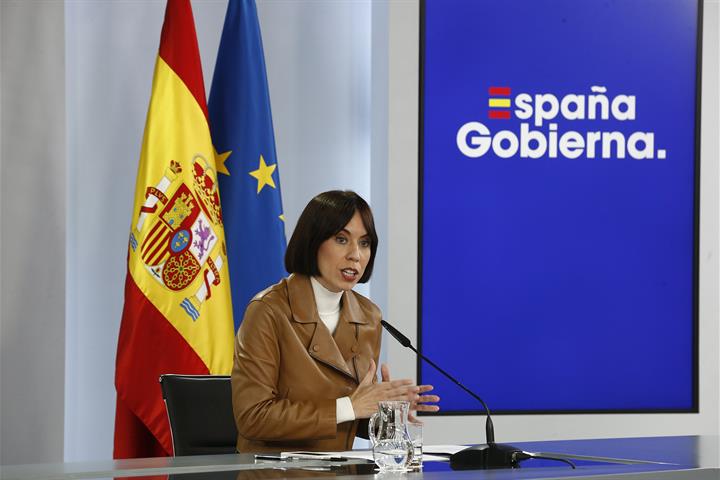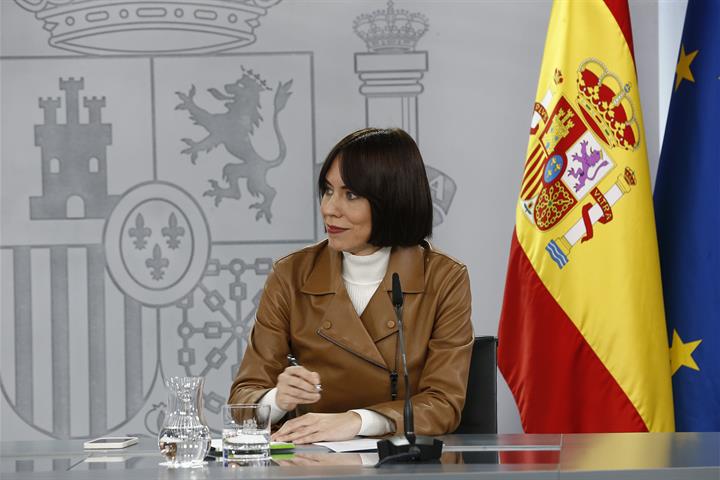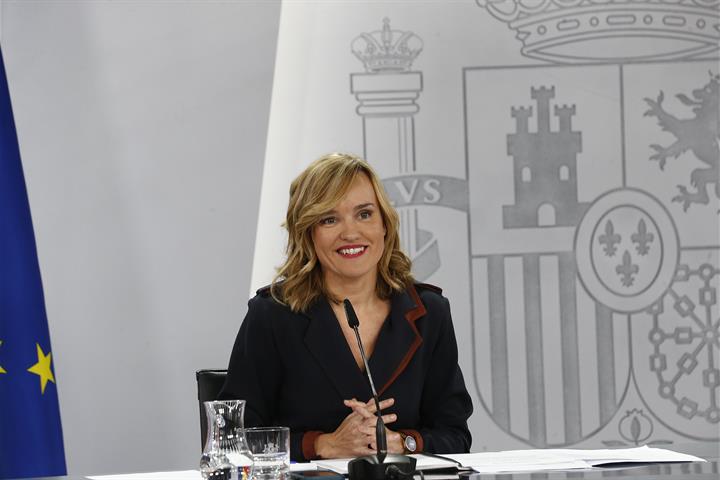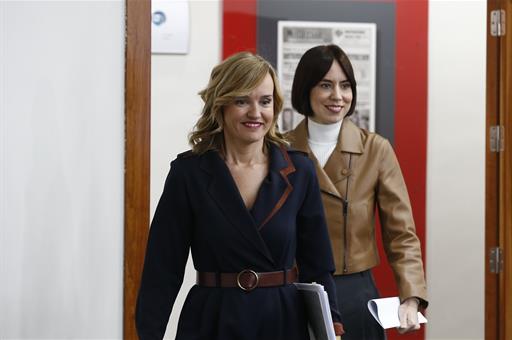The Government of Spain earmarks more than 1 billion euros to fund the science system and attract talent
Council of Ministers - 2023.11.28
Moncloa Palace, Madrid
The Council of Ministers has approved five calls for proposals to fund scientific research and to attract and retain talent, with a total budget of 1.086 billion euros.
The Minister for Science, Innovation and Universities, Diana Morant, stressed that this amount comes exclusively from the national budget and represents an increase of more than 65% since 2018. She also stressed that during the last legislature, the government doubled investment in science, which is currently the highest in history, and approved the largest public employment offer in this field in the last 15 years.
Morant stressed that "citizens know perfectly well what these 1 billion euros mean" because they are demanding that the government invest more and more in research: "They know that close to their homes, in universities, in research centres, in hospitals, advanced therapies are being researched that will practically carry the name and surname of each and every citizen to cure, for example, cancer".
The minister explained that two calls are aimed at funding the system and the other three are committed to scientific talent.
Knowledge Generation Projects
 The Minister for Science, Innovation and Universities, Diana Morant, during her speech at the press conference after the Council of Ministers | Pool Moncloa / José Manuel Álvarez
The Minister for Science, Innovation and Universities, Diana Morant, during her speech at the press conference after the Council of Ministers | Pool Moncloa / José Manuel Álvarez
The Government has approved the call for Knowledge Generation projects and the associated pre-doctoral contracts for an amount of 655 million euros, which can be increased by a further 50 million.
Diana Morant pointed out that the government is thus responding to a historic demand from the scientific community and reiterated that this is the knowledge generation plan's highest budget in history for a call for proposals, and that it does not include funds from the Recovery, Transformation and Resilience Plan.
This programme, the minister pointed out, has increased its budget by 77% since 2018 and by 5% with respect to 2022, and funds more than 3,000 research groups in all areas of knowledge.
Morant also stressed that the government continues to dignify the working conditions of researchers by increasing the minimum salary for thesis contracts by almost 15% in the last two years: "We understand that, as a government, we have to set an example and we are the first ones who have to increase these salaries".
Strategic Action in Health
The Executive has also approved the Strategic Action in Health, which is the main call for biomedical research projects, and has endowed it with 138 million euros, which can be increased to 40 million.
The minister indicated that the Carlos III Health Institute is managing these funds, to which a further 137 million euros will be added linked to the Strategic Project for Economic Recovery and Transformation (PERTE) for Cutting-Edge Health.. 275 million will be mobilised for health research.
Grants for Ramón y Cajal contracts
The Council of Ministers has also approved the call for grants for Ramón y Cajal contracts, with a budget of almost 130 million euros, which can be increased by a further 15 million. This decision promotes the incorporation in research organisations of both Spanish and foreign national research personnel with an outstanding track record.
Specifically, 494 five-year contracts will be funded for postdoctoral researchers with highly promising careers in all areas of knowledge. In addition, these contracts provide for an increase in the minimum salary of these scientists of excellence, who will receive almost 20% more than in 2018.
Grants for Juan de la Cierva contracts
 The Minister for Science, Innovation and Universities, Diana Morant, during her speech at the press conference after the Council of Ministers | Pool Moncloa / José Manuel Álvarez
The Minister for Science, Innovation and Universities, Diana Morant, during her speech at the press conference after the Council of Ministers | Pool Moncloa / José Manuel Álvarez
The Government has approved the call for applications for Juan de la Cierva contracts with the aim of promoting the incorporation of young people with a doctorate degree in Spanish R&D centres, thus helping to attract and retain talent. It has a budget of 36 million euros, which can be increased by a further three million.
The minister announced that the call will offer 500 grants, which is 10% more than in 2018. It also increases the minimum salary of these researchers by more than 10%.
Beatriz Galindo grants
The Executive has also authorised the call for applications for Beatriz Galindo grants, with a budget of more than 19 million euros, which can be increased by a further 325,000 euros.
Diana Morant pointed out that it will allow 100 professors of recognised prestige who are currently developing projects abroad to be attracted to Spanish public universities.
Commitment to science and research
The minister recalled that the government has earmarked 3.991 billion euros in the budget for science and innovation and aims to allocate 3% of Gross Domestic Product by 2030. In addition, it has provided stable jobs for 2,476 researchers, 15% of the workforce in research centres in Spain, and has called for 2,598 internal promotions.
Diana Morant concluded by saying that the Executive has implemented the reforms that the system needed with the approval of the Law on Science, Technology and Innovation, and the Organic Law on the University System, which "reject precarious models".
"There is an alternative to precariousness in our country, also in the field of science. We have put it into law, we are complying with the law and, with a fitting budget allocation, today 50% of new jobs created are in the field of R&D&I&d, that is, science, innovation and digitalisation. 50% of jobs, high skilled jobs, jobs that are helping the productive sectors and the General State Administration to be much more competitive than we were", she remarked.
Improvements to roads and AVE to Asturias
 The Minister for Education, Vocational Training and Sports, and Government Spokesperson, Pilar Alegría, during her speech at the press conference after the Council of Ministers | Pool Moncloa / José Manuel Álvarez
The Minister for Education, Vocational Training and Sports, and Government Spokesperson, Pilar Alegría, during her speech at the press conference after the Council of Ministers | Pool Moncloa / José Manuel Álvarez
The Council of Ministers has earmarked 142.4 million euros for the maintenance of 435 kilometres of roads in Cantabria, Madrid and the province of Barcelona, a measure that "has a direct impact on improving the lives of citizens", according to the government spokesperson, Pilar Alegría.
This investment is in addition to 13 other contracts authorised in the last month, amounting to 339 million euros, for 2,375 kilometres of roads in the provinces of A Coruña, Ciudad Real, Teruel, Huesca, Palencia, Albacete, Salamanca, Soria, Valencia, Castellón, Madrid, Pontevedra and Barcelona.
Also in relation to infrastructures, Alegría highlighted that this week an objective that has been demanded for more than 20 years has been fulfilled with the launch of the High Speed Railway in Asturias. The Government Spokesperson said it was an "historic event", the "most complex civil engineering project in Europe" and a demonstration of "the technical and human capacity of public sector companies".
Rights of people with disabilities
In the framework of the International and European Day of Persons with Disabilities, which is celebrated on 3 December, the Council of Ministers has approved an institutional declaration to highlight the coalition government's commitment to the human rights of persons with disabilities.
The text also defends the reform of Article 49 of the Spanish Constitution, as already announced by the President of the Government, Pedro Sánchez, in his investiture debate speech.
Combating gender-based violence
The Minister for Education, Vocational Training and Sports began the press conference following the Cabinet meeting by condemning the latest gender-based crimes committed in Spain, in which two women and a girl were murdered in Madrid. Already 53 women have been murdered by their partners or ex-partners in 2023.
"It is essential that we continue to work together to put an end to this male violence that impoverishes us, that weakens us as a society and that, if anything, makes it clear to us that we cannot take steps backwards", said Pilar Alegría.
The Government Spokesperson also stressed the need not to "trivialise" this violence and to continue to be "forceful in the face of this drama". Alegría has sent "a clear message to the women of this country": "They are not alone and we will do everything we can to end this structural violence".
Non official translation





